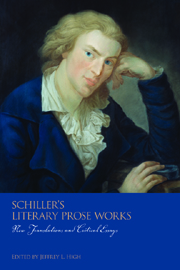Book contents
- Frontmatter
- Contents
- Foreword
- Preface
- Acknowledgments
- Notes on the Translations
- Introduction: Schiller and the German Novella
- The Translations
- The Critical Essays
- 9 (A fragment of) A True Story (from most recent history): The Truth in Schiller's Literary Prose Works
- 10 Playing with the Rules: Schiller's Experiments in Short Prose Fiction, 1782–1789
- 11 Diderot and Schiller's “Revenge”: From Parisian Parody to German Moral Education
- 12 True Crime and Criminal Truth: Schiller's “The Criminal of Lost Honor”
- 13 Der Geisterseher: A Princely Experiment or, the Creation of a “Spiritualist”
- Chronological List of Schiller's Literary Prose Works in English Translation
- Works Cited
- Notes on the Contributors
- Index
13 - Der Geisterseher: A Princely Experiment or, the Creation of a “Spiritualist”
from The Critical Essays
Published online by Cambridge University Press: 05 February 2013
- Frontmatter
- Contents
- Foreword
- Preface
- Acknowledgments
- Notes on the Translations
- Introduction: Schiller and the German Novella
- The Translations
- The Critical Essays
- 9 (A fragment of) A True Story (from most recent history): The Truth in Schiller's Literary Prose Works
- 10 Playing with the Rules: Schiller's Experiments in Short Prose Fiction, 1782–1789
- 11 Diderot and Schiller's “Revenge”: From Parisian Parody to German Moral Education
- 12 True Crime and Criminal Truth: Schiller's “The Criminal of Lost Honor”
- 13 Der Geisterseher: A Princely Experiment or, the Creation of a “Spiritualist”
- Chronological List of Schiller's Literary Prose Works in English Translation
- Works Cited
- Notes on the Contributors
- Index
Summary
IN MAY OF 1786, ELISE VON DER RECKE published in the Berlinische Monatsschrift an exposé of the occultist deceptions of the Sicilian adventurer Guiseppe Balsamo, alias Count Cagliostro, during his stay at the court of Courland in 1779. Shortly thereafter, Prince Friedrich Heinrich Eugen of Württemberg wrote for that same monthly journal — in which Kant's definition of Enlightenment had appeared only two years previously — a response defending the possibility of communication with the spirit world. A member of the Protestant side of the ruling ducal family in Schiller's Württemberg, the young Prince had two sisters who already had converted to Catholicism. His essay was taken as a sign that he, too, was considering a conversion, thus raising the possibility that Duke Karl Eugen (best known today for his complicated relationship with the young Schiller), who had no direct male heirs, might one day be succeeded by a nephew who was a fellow Catholic. Schiller, acquainted with the political situation in his native land and looking for a sensational subject that would attract more readers to his journal Thalia, began working on a story that appeared in five installments between 1787 and 1789 before being published in book form as Der Geisterseher. Aus den Memoires des Grafen von O** (1789; 3rd rev. ed. 1798, The Spiritualist. From the Memoirs of Count von O**). The term Geisterseher is not Schiller's invention. Kant had employed it in Träume eines Geistersehers, erläutert durch Träume der Metaphysik (1766, Dreams of a Ghost-seer, elucidated through Dreams of Metaphysics), his critique of Emanuel Swedenborg's theosophicalcosmological speculations that attempts to regulate the products of the imagination through the beginnings of his own critical philosophy.
- Type
- Chapter
- Information
- Schiller's Literary Prose WorksNew Translations and Critical Essays, pp. 234 - 250Publisher: Boydell & BrewerPrint publication year: 2008



